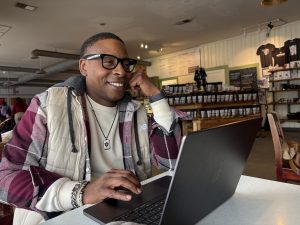Durham Mayor Steve Schewel’s virtual Q&A with faculty and staff of Duke University’s public policy school on Wednesday offered a glimpse into how the city is handling police violence protests and the coronavirus pandemic.
“We had last week in Durham, verelly powerful forceful protests, eloquent protests . . . about, not just the murder, the heinous inhuman and cold murder of George Floyd,” Schewel said, “but also the racism in our system that persists.”
Nearly 100 people attended the hour-long online event. Duke faculty and staff, as well as the public, submitted questions via Zoom for Sanford School of Public Policy Dean Judith Kelley to ask the mayor.
Much of the conversation revolved around policing, including the department’s funding and potential reforms. The mayor said that last week, he signed a pledge to review and reform policies around police officers’ use-of-force within the next 90 days.
“I’m happy to say that our police chief has already responded to the eight particular tactics that were highlighted in that [pledge],” he said.
Many Durham residents are calling on city officials, including the mayor, to defund the police department. But Schewel said the police budget will instead be increasing by just over $1 million dollars. In 2019, the police department asked for an estimated $69 million and spent $67 million; this year, the city has a proposed police budget of $70 million.
“That million dollars is not adding any police officers,” he said, assuring attendees that the money will pay for state-mandated pensions and mandatory raises for officers.
Kelley asked Schewel if he felt Durham police were where they needed to be in the community. Schewel responded that Durham has spent years “reforming the way our police operate.”
He added that police have and will continue to respect demonstrators’ right to protest, adopt non-confrontational tactics and monitor if traffic stops are made because of racial profiling.
“We have racial equity training for all our officers, we have de-escalation training for all of our officers, we have crisis intervention training,” he said. “Our police department is far from perfect . . . but we are putting in a lot of effort and have put in a lot of effort over the last few years to reform our police force.”
The city also plans to establish alternatives to policing, he said, so officers are not called in for something better handled by medical services, mental health services or social workers.
He did not offer any details about how specific programs would work or be funded, or say if the city will reduce the number of police officers over time.

The Q&A also covered voting during the coronavirus pandemic. Schewel said it was up to the Board of Elections and the state to decide how to handle voting processes in November’s general election.
“Right now, there isn’t quite a strategy,” he said. “There are a lot of people who are thinking about it, and I have a lot of confidence. But we’re going to need good guidance from the state.”
Last year, the North Carolina legislature passed a law making it harder to request absentee ballots, which is being challenged in court. Schewel said he’s worried about residents having easy absentee voting options and safe, quick in-person polling stations.
“Voter suppression is real, and I think that our legislature, unless they agree to have mailed to every voter an application for an absentee ballot, I think that that will be suppressing the vote,” Schewel said.
Other attendees asked about the city’s COVID-19 response and the reopening of Durham schools. Schewel said he wasn’t sure what would happen in the fall, but is concerned the continued increase of cases in Durham could lead to a resurgence of the virus.
One program he emphasized was an effort to address unequal access to remote learning during the pandemic. Durham Public Schools will spend $8 million providing Chromebooks to students and installing wireless hotspots around the city to help ensure every child has access to digital learning.
Throughout the conversation, Schewel responded to many questions with “I don’t know.” He reiterated that some decisions — especially those about the pandemic — depend on state lawmakers.
“As we all know we’re in an incredibly difficult time in our nation,” he said, “It’s a hard time to be mayor, I’ll tell you that.”





